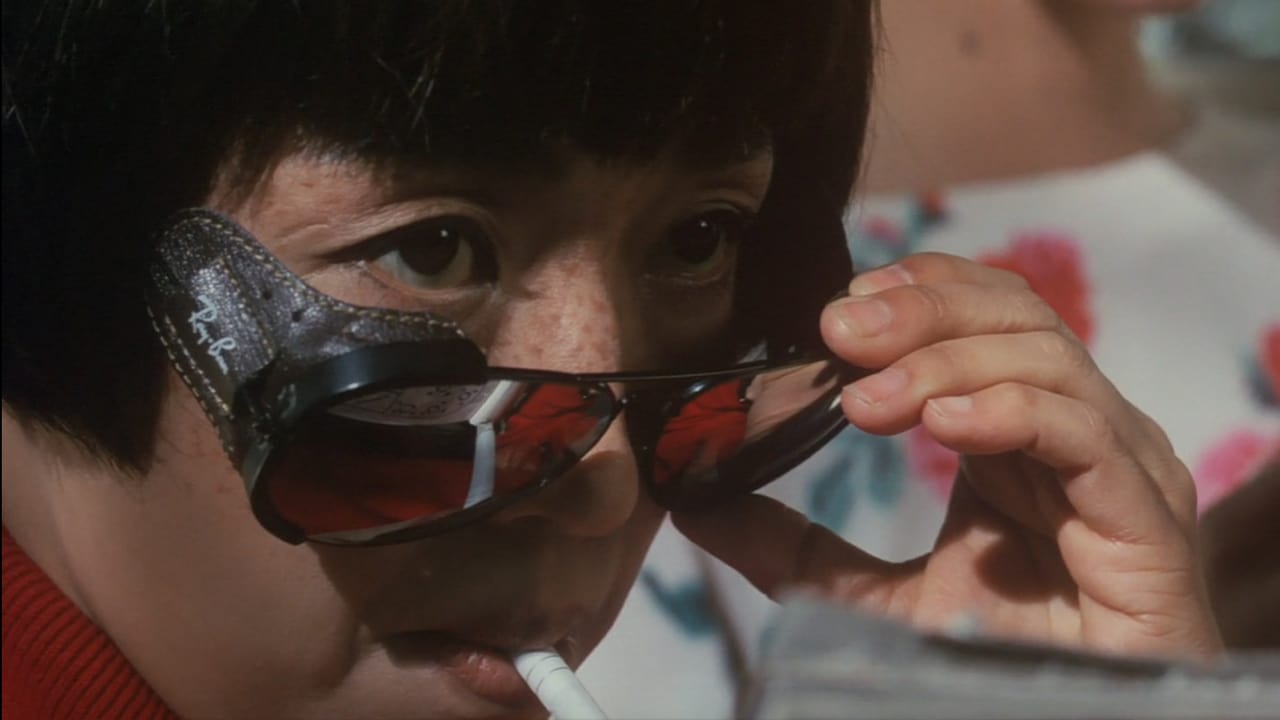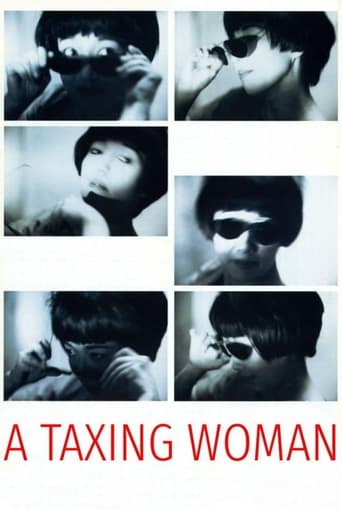Infamousta
brilliant actors, brilliant editing
Huievest
Instead, you get a movie that's enjoyable enough, but leaves you feeling like it could have been much, much more.
PiraBit
if their story seems completely bonkers, almost like a feverish work of fiction, you ain't heard nothing yet.
Brooklynn
There's a more than satisfactory amount of boom-boom in the movie's trim running time.
ebiros2
The movie delves into popular Japanese myths about how people hide their money, and how the government investigates people.This movie made Jyuzo Itami, and his wife Nobuko Miyamoto very famous in Japan. The title "Marusa" became common word in Japanese culture after the release of this film. Very rare that a husband and wife team succeeds so much in the film business for so many years. The story is about government tax investigators investigating a love hotel magnate's flow of money. Both sides are ingenious in the way they hide the money and how they investigate into the trail of those money. Yakuza, concubine, wife, and even the bank are all in it.In Japan, where both corporate and personal taxes are astronomical, tax avoidance is topic of most successful people. One such notable individual was Konosuke Matsushita who was the founder of Panasonic. He quoted "If this was in the feudal era, such tax system (as Japan) would have caused a massive revolt by the farmers.". People can be taxed up to 97% in Japan, which makes us wonder if the people in this movie had the right to do what they were doing. Taking 97% of your income is stealing of your income, and that should be deemed a crime, not the ones who are protecting their share of their wealth. People in this movie no doubt were in this tax bracket.To put this in perspective, in the US, many high income salaried workers working in IT and other higher paying jobs are only facing around 57% tax. Even at this rate, your high wages becomes only a so so income after IRS and local government gets their share (Did you know that IRS is not part of the Federal Government, just as the Federal Reserve ?). Much of these taxes are used or managed in incompetent ways. Taking all this into consideration, I think it's perfectly justifiable for people to try and shelter their wealth.So, the movie is somewhat gray in who were the real bad guys. If I were in Gondo's shoes, I might have opted for novel ways to avoid tax too. The movie then turns into the real bad guys picking on the weak.
pontifikator
This is a charming film about a tax collector in Tokyo pitted against a gangster. They fall in love. Directed and written by Juzo Itami, "A Taxing Woman" stars his wife, Nobuko Miyamoto, as the tax collector and Tsutomu Yamazaki as the tax-evading criminal.It's a fascinating glimpse into Japanese culture in 1987, when the picture was made. Yamazaki plays the owner of a chain of love hotels, and he hides his income. Miymato plays a recently-promoted tax auditor, and she is given the job of ferreting out his hidden income so that the proper tax is collected. The cat and mouse game begins.The opposing actors have a real chemistry between them, and their blossoming love comes as no surprise. Since the plot involves love hotels, we get some nudity, and because the cops and crooks are involved, there's a chase scene, too. Miyamoto is shown as a tired woman with bags under her eyes, but she's an attractive and worthy opponent to our tax cheat. That the crook is a complex man capable of - and worthy of - love takes the movie out of the ordinary comedy genre.If you like this comedy, there's an even lighter farce with the two lead actors you might enjoy: "Tampopo," which preceded "A Taxing Woman." "Tampopo" involves setting up the perfect raman restaurant, with chefs closely guarding their noodle recipes and other such nonsense. An amusing movie with food eroticism."A Taxing Woman" was so popular, they did a sequel, but I liked the original so much I didn't see the sequel.
sourceoftheend
The plot of A Taxing Woman is interesting/enthralling, regardless of the production date or language of the film. Watching tax evasion cases unfold is surprisingly interesting, presented in a manner that shows the more human side of government organizations. (OK, if not the 'human side', at least you get to see what it's like on the inside.) From a cultural perspective, a 1980s Tokyo is also interesting, with shots of the cityscape, pachinko parlors, love hotels, etc.One last comment: There is nudity in this film, but It adds to the story of the film, justifying why some of the characters do what they do.
Zaphod B. Goode
I'm fairly certain I saw this film in its original theatrical release in the '80s(memory is dim,) and recently found it on DVD with considerable difficulty. The transfer to DVD is rather basic - no letterbox, a bit dark and very little in the way of special features - but despite disgust at the fact that the film hasn't been digitally remastered and given more than a bargain-basement DVD presentation, I love the film itself every bit as much as I did the first time I saw it.Philosophically, i.e. in terms of ethical theme, "A Taxing Woman" is one of those stories in which identifying a hero is difficult - no clear black and white, only greys. Ryoko (Miyamoto Nobuko) and Gondo (Yamazaki Tsutomu) are of course the dueling protagonists, but each is anti-heroic, something I ordinarily can't stand: Gondo is the operator of a chain of Japan's ubiquitous "Love Hotels," where lovers go to find short-term lodgings for their trysts, who's got a complex system in place to evade Japan's horrific taxation; Ryoko is a tax auditor, later promoted to investigator, who, though admirable in her relentless dedication and competence, is party to some of the most horrendous legal assaults on businesspeople imaginable. The film's moral doesn't crystallize until the final scene - Gondo states a defense of his right to pursue his own happiness via an oblique reference to kids happily playing in a park below, then makes a dramatic and symbolic statement about the root meaning of outrageous taxation by slicing his finger and revealing to Ryoko his long-sought hidden bank account - via an account number scrawled in his very blood. After he walks away the camera lingers on the back of Ryoko's head, signifying her sudden crisis of conscience over her chosen profession.In terms of style alone "A Taxing Woman" is an absolute masterpiece. The mood throughout is of a delightful farce in the mold of one of Blake Edwards' "Pink Panther" films, albeit far more subtle, obviously. The music, contrary to some claims here, is truly unique, memorable and nothing short of outstanding, much like Mancini's - fleshing out the farcical cat-and-mouse mood perfectly via two brief, repeating oboe (clarinet?) melodies laid over a bouncy 5/4 time signature that reappear at key points throughout the story. The outrageous lengths to which the tax auditors and inspectors go to ferret out tax evaders is exaggerated (one would hope - I've never lived in Japan,) for great comedic effect. This isn't a rolling-in-the-aisles slapstick comedy and isn't intended as one, but the bureaucrats' combination of ruthlessness and obsessive yet oddly endearing personal dedication to their task, balanced by the businesspeople's often intricate and similarly humorous schemes to hang onto their property in the onslaught, is the exaggerated core conflict that pulls you into the plot and makes the film irresistibly charming.The fairly simple plot setup in "A Taxing Woman" derives its incredible depth by the fact that it's almost entirely character-driven - Miyamoto and Yamazaki are such vivid personalities and the opposing chemistry between them so potent that you will find yourself thinking about them for weeks after the fact, as though they were your close personal friends. That is my psychological litmus test for a great film: "Do the characters stay with me long after I've seen it?" "A Taxing Woman" succeeds in spades.A dose of gritty realism - though with a patina of humor as well - is added to the mix in the character of the violent Yakuza boss Ninagawa, played by Ashida Shinsuke. That element is underscored in the real world by the fact that director Itami was attacked on the street and had his face slashed by five Yakuza in 1992 after the release of his film "Minbo no Onna," a.k.a. "Minbo - or the Gentle Art of Japanese Extortion." He was subsequently killed when he "fell" from a hotel balcony, an apparent but suspicious suicide that was treated by the police as a possible homicide. The world lost a great artist, and "A Taxing Woman" remains a timeless masterpiece. We can only hope that whoever owns the rights to it will finally give it the digital translation and wide release it deserves.

